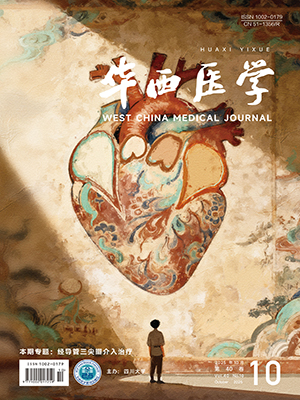| 1. |
Ren W, Zhu Y, Lan J, et al. Susceptibilities of human ACE2 genetic variants in coronavirus infection. J Virol, 2022, 96(1): e0149221.
|
| 2. |
郭艺飞, 张继明. 严重急性呼吸综合征冠状病毒 2 Omicron 变异株研究进展. 微生物与感染, 2022, 17(1): 2-8.
|
| 3. |
Douaud G, Lee S, Alfaro-Almagro F, et al. SARS-CoV-2 is associated with changes in brain structure in UK Biobank. Nat, 2022, 604(7907): 697-707.
|
| 4. |
中华人民共和国国家卫生健康委员会. 新型冠状病毒感染诊疗方案(试行第十版). 中国合理用药探索, 2023, 20(1): 1-11.
|
| 5. |
Mason KP, Green SM, Piacevoli Q. Adverse event reporting tool to standardize the reporting and tracking of adverse events during procedural sedation: a consensus document from the world siva international sedation task force. Br J Anaesth, 2012, 108(1): 13-20.
|
| 6. |
李涛, 张允岭, 赵晖, 等. 吸烟与脑卒中高危人群颈动脉粥样硬化发生的相关性分析. 中西医结合心脑血管病杂志, 2015, 13(2): 175-178.
|
| 7. |
梁彪, 胡琳琍, 王芳, 等. 无痛胃镜诊疗的临床应用. 中国内镜杂志, 2006, 12(5): 520-523.
|
| 8. |
中华医学会麻醉学分会气道管理学组. 新型冠状病毒肺炎危重型患者气管插管术的专家建议 (1.0 版). 中华麻醉学杂志, 2020, 40(3): 287-290.
|
| 9. |
王梓, 刘昕, 高巨. 老年患者无痛胃肠镜检查术后 PACU 滞留时间延长的危险因素. 中华麻醉学杂志, 2023, 43(2): 146-151.
|
| 10. |
刘婉君, 陈丽萍. 吸烟对下呼吸道诱导痰中 IFN-γ、IL-4、IL-5 表达的影响. 中国微生态学杂志, 2018, 30(7): 795-797, 801.
|
| 11. |
祁闻, 李仁奇, 袁亮, 等. 吸烟对无痛胃镜检查男性患者丙泊酚用量的影响. 临床麻醉学杂志, 2018, 34(11): 1092-1094.
|
| 12. |
杨伟东, 李双月, 江仁, 等. 全身麻醉术后下呼吸道感染相关影响因素分析. 中华医院感染学杂志, 2018, 28(9): 1374-1376.
|
| 13. |
中华医学会呼吸病学分会哮喘学组. 咳嗽的诊断与治疗指南(2015). 中华结核和呼吸杂志, 2016, 39(5): 323-354.
|
| 14. |
龙茹华, 秦婷婷, 邵建林. 布地奈德雾化吸入预防感染后咳嗽患者无痛胃镜检查呛咳发生. 昆明医科大学学报, 2018, 39(2): 76-79.
|
| 15. |
谢金凤. 孟鲁斯特联合雾化吸入治疗小儿感染后咳嗽的疗效观察. 世界最新医学信息文摘, 2021, 21(95): 204-205.
|
| 16. |
Moscarino S, Kötter F, Brandt M, et al. Influence of different surgical concepts for moderate skeletal class Ⅱ and Ⅲ treatment on the nasopharyngeal airway space. J Craniomaxillofac Surg, 2019, 47(10): 1489-1497.
|
| 17. |
Kawasuji H, Morinaga Y, Tani H, et al. SARS-CoV-2 RNAemia with a higher nasopharyngeal viral load is strongly associated with disease severity and mortality in patients with COVID-19. J Med Virol, 2022, 94(1): 147-153.
|




